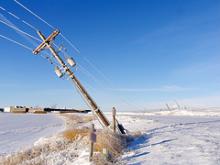Connecticut Power Outage Shows Superiority of Community Ownership
Rob Cox, a writer for Reuters, has delved into the disappointing response of some investor-owned utilities in Connecticut following the recent blizzard, noting the better performance of muni power companies. Hurricane Irene recently revealed the similar superiority of muni electrics compared to the investor-owned in Massachusetts, prompting us to note the parallels with Wired West's initiative in Western Massachusetts. They have created an electric light coop to build a next-generation fiber-optic network out to everyone in the area.
And on the same day that Longmont embraced locally owned broadband in Colorado, nearby Boulder started the process of kicking Xcel out in favor of an electric grid that is accountable to the public.
So let's see what the New York Times has to say about municipal ownership of infrastructure. They begin by noting the many ways Connecticut Light and Power (the subsidiary of Northeast, an investor owned utility presently consolidating with another large IOU) has cut its maintenance spending over the last few years -- leaving many more power lines vulnerable to the tree-bending blizzard.
There’s even a near-perfect model of how Connecticut Light and Power could have done the job better. Norwich, Conn., a city of 40,000, has owned its own electric utility, as well as those for sewage, gas and water, for 107 years. Norwich Public Utilities’ customers pay, on average, a bit less than Connecticut Light and Power’s. Yet after this past weekend’s snow dump, power was out for only about 450 of its 22,000 customers — and for no more than an hour. As of Thursday morning, nearly half a million Connecticut Light and Power customers were still waiting for the lights to go on. That’s not luck, either. After Irene hit, just 13 percent of the city’s customers lost their power for more than a day. Within three days, the whole of Norwich had been restored. It took more than a week for Connecticut Light and Power to fully restore power.To reiterate, the publicly owned system is cheaper, more reliable, and responds more quickly in emergencies.



